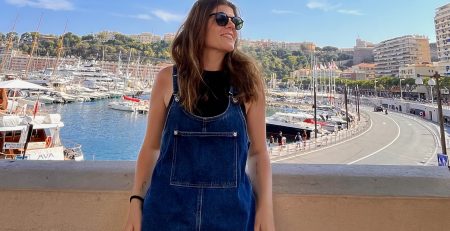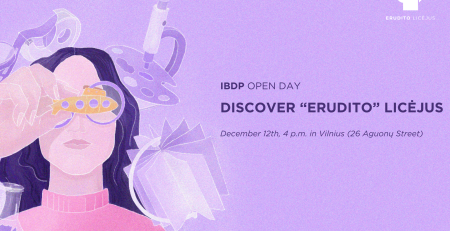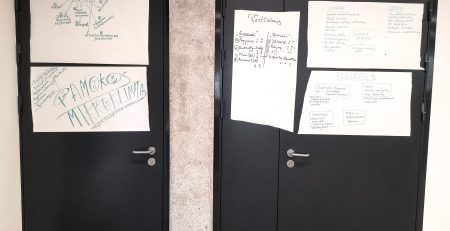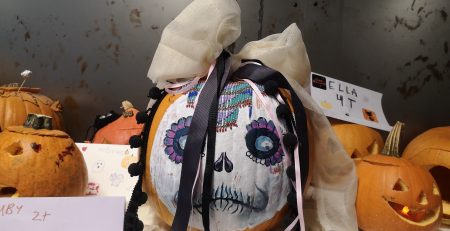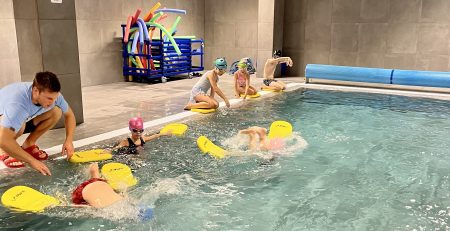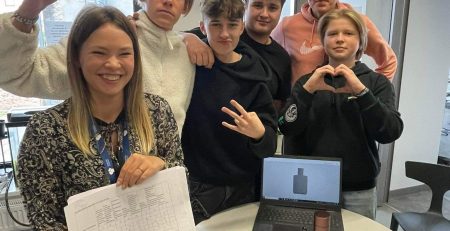
Entrepreneurship projects in grades 5-10 propose socially responsible ideas for sustainable development and reflect global trends
Erudito2023-11-23T14:11:12+03:00Returning from the global online innovation conference “World WebSummit 2023” in Lisbon, the founder and head of “Erudito” lyceum, Assoc. Prof. Dr. Nerijus Pačėsa, noted that progressive young people, particularly those creating businesses (mostly online, integrating artificial intelligence), are highly sensitive to preserving the planet and conserving resources. They emphasize respect for each other and care about lifestyle – sustainability is a very clear trend. These thoughts were confirmed by the initial entrepreneurship projects of “Erudito” licėjus’ main classes, which presented more responsible and sustainable business ideas than ever before. “This shows that we are moving in the right direction by paying much attention to entrepreneurship education and nurturing environmentally sensitive and initiative-driven young individuals who care about the environment”, says Assoc. Prof. Dr. N. Pačėsa.
“ChatGPT” defines sustainability as a concept encompassing actions and practices aimed at ensuring that existing sources and natural resources are used in a way that will be sufficient for future generations. Sustainability comprises three main aspects: economic, social, and environmental. Economic sustainability is associated with the ability to maintain economic growth and well-being over a long period without depleting finite resources. Social sustainability relates to justice, equality, people’s well-being, and safety within a community. Environmental sustainability means the ability to use natural resources without causing harm to the environment and ensuring that ecosystem functions are maintained in the long term. This concept is crucial in creating a long-term and stable way of life that does not harm the environment or future generations.
At “Erudito” licėjus, students from Kaunas and Vilnius, representing national and international classes, demonstrated their entrepreneurial skills during the presentation of the first entrepreneurship project titled “Sustainable Development and Lithuania: Our Well-being in Our Own Hands.” More than 100 teams presented their ideas for Lithuania. Over six weeks, students developed a product or service and collaborated to enhance their entrepreneurial, critical thinking, and teamwork skills.
The projects were evaluated by representatives of teachers, parents, and business and entrepreneurship education organizations (Kaunas University of Technology, “Junior Achievement Lithuania”). The evaluation committee assessed aspects such as the presentation of the project team (visuals, graphics), the problem addressed by the business idea, the solution and competitive advantage, market analysis, presentation duration, preparation, language proficiency, how the service will operate (its prototype), pricing and cost analysis, product or service delivery to the customer (advertising, distribution), and teamwork. The entire lyceum community attended the presentations to personally assess the potential new businesses.
The projects were evaluated in various categories and nominations, including the most interesting technological solution, the most promising idea for higher profitability, the best solution with minimal costs, the most innovative idea, the most entrepreneurial and creative business, environmentally friendly initiatives, ideas for sustainable development businesses, socially responsible businesses, and the best product presentation.
Teams “Salt Bubbles” (6B) (Committee assessment: “Sustainable idea”), “Unnamed” (8B) (“Very good and beautiful idea, perfectly fits the project theme. Should consider competitive advantage over other platforms”), and “Protect the Planet” (6T) were recognized for their environmentally friendly business ideas.
For socially responsible businesses, “Very Bag” (6A) (“Sustainable idea related to individual hobbies”), “Kanzas” (7A) (“Innovative idea addressing sustainability and societal challenges. Product price and prototype well thought out”), “Best Power” (7T) (“Good idea addressing a problem”), LERA (10A), and their social restaurant for seniors, “Žiloji pypkė” (“Best social business idea”). “Our social restaurant aims to unite elderly people, improve their well-being, provide them with activities, and preserve national traditions”, say the creators of the “Žiloji pypkė” project.
“We will provide services for seniors and individuals with limited mobility. With our transportation, they can comfortably travel to any chosen geographical point in Lithuania, engaging in interesting activities. Our services differ from other competitors because we offer trips throughout Lithuania, convenient timings, comfortable transportation tailored to customers with limited mobility. Also, our drivers are familiar with care specifics, communicate pleasantly, so even a short journey can become a delightful moment”, present the “Kanzas” team about their service.
The idea of sustainable development was represented by “Banana Pencil” (5T) (“Problem solved, good teamwork, and idea”), eco-friendly beeswax candles and live honey (buckwheat, linden, autumn honeydew, milk) producing and environmentally friendly material using, nurturing beekeeping traditions “Gilė” (6B) (“Excellent presentation. Beautiful design, aesthetics”), “Funky Monkeys” (7C), recognized for the most creative idea of selling recycled rags. “This would contribute to resource conservation and generate interest in recycled items”, assures the team that creates tongue scrapers from tin cans, glass bottle caps, and metal snails. “Shark Tank” (8B) (“Wonderful team idea that perfectly fits the personalities of team members”).
“We offer bags with drawings of endangered Lithuanian animals and plants”, presents “Shark Tank”. “Bags are made from offcuts of materials used by other companies, they are sturdy, high-quality, and functional. Our product is unique because it is handmade – we do the sewing, design creation, and painting on the bag ourselves. Moreover, these bags help raise awareness about endangered animals and plants – thus drawing attention to current environmental issues such as nature conservation, deforestation, marine, river, and lake pollution.”
The most entrepreneurial business idea was “Spiceo” (6A) (praised for a sustainable product using a family recipe, visually well executed), “Byznismenai” (7B), proposing an app for food enthusiasts, “Gnome Gourmet”(“The presented idea was innovative and addressed a sustainability-related problem”), “Shailushy” (7T) (“Great visuals and teamwork”), “StartUP” (10A).
The “Lithuanian Ship” project (6B) was also evaluated by the committee as an authentic, innovative, and sustainable business. Sixth-graders proposing an electronic book of Lithuanian recipes say their product is unique because it offers only authentic Lithuanian dishes such as ‘vėdarai,’ ‘švilpikai,’ acorn milk, and others. “We chose an e-book format because it is convenient, ecological, and innovative”, say the creators.
“We hope to create an app for gourmets, full of organic dessert recipes. We aim to show people that non-organic products are often contaminated with fertilizers and chemicals, which can be detrimental to human health. We will also try to introduce them to the idea that non-organic products often require more carbon dioxide (CO2) emissions due to reasons such as soil conservation and increased energy consumption”, present the creators of the “Gnome Gourmet” app “Byznismenai” at a global level.
Innovative Idea – “KEMBA” (5A) and their interactive interpretation and conquerable Vytautas the Great sword, designed to engage children with interactive games outdoors (“A lot of work has been put in, a very good idea”), “Bet kas” (7B) also recognized for the most interesting technological solution (“The team’s presented idea was extremely innovative and solved a problem related to sustainability”).
“We noticed that people, when going jogging, rollerblading, or similar activities, have to make a decision – whether to take a backpack that’s uncomfortable, hold a water bottle in their hand and worry it might fall, or just not take anything. Our idea solves this dilemma – we offer a belt specifically tailored for sports, doesn’t restrict movement, and to which all necessary items can be attached. It should have a specially designed water bottle holder, a transparent plastic holder for the phone, and several other compartments for various items”, present the seventh-graders about their belt idea. Reflecting on the project’s progress and work, the students admitted feeling frustrated at taking a long time to generate the idea, changing the team twice, and facing challenges in creating the belt prototype, which they were glad to have overcome.
The most interesting technological solution was presented by “Versliukai” (5A) and their hazelnut picker (“Good idea, excellent execution. Sustainable. They actually tested their created product”), “StartUP” (10A) (“Technologically great idea, very well presented”), “Intell Swipe” (8T) (“Great idea and prototype”).
The most promising idea to generate higher profits – “Barbie Bikes” (6A) (“Excellent idea, excellent presentation, engagement and enthusiasm from the children themselves”), “Enviro Cosmetics” (6T) proposing cosmetics made from ecological components, “Lithuanian Wonders” (7C) (“The presented idea was innovative and addressed a problem; the team put in extra effort to present the idea”).
The best solution with minimal costs – “6 Brothers” (5B) (“Original idea for product realization”), “Balenciaga” (5T) (“Well-solved problem, visuals, teamwork”), “ERU” (7C) homemade bread kvass, “Kalėdos” (9A) (also recognized for the most creative idea: “Great social project reflecting a beautiful idea – following the famous fairy tales for children, involving children in the world of fairy tales through melody, sounds. It’s delightful that the team aims not for profit, but genuinely wants to solve social problems”). “Our activity is important because we help parents save time and develop children’s imagination, foster interest in Lithuanian fairy tales. We plan to donate the earned money to ‘ankstukai.lt’ (early starters)”, present the ninth-grade team about their project.
The most creative idea – “Students” (5A) (“Original idea for wristbands with hanging cookies ‘Yumm Yumm’”), “No Name” (7T) (“Good visuals created using artificial intelligence”).
At “Erudito” licėjus, students from main classes present five long-term projects within a year (every 6 weeks). New project presentations will take place on December 15. We are looking forward to hearing new ideas for sustainable and responsible business.



